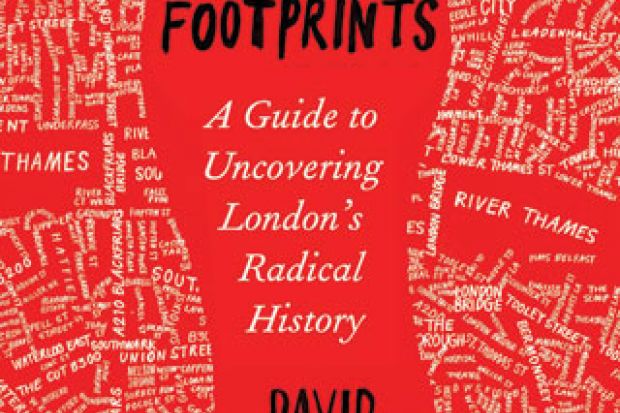Walking London’s streets, if you close your eyes for a moment, ignore your ears and imagine the smells and the tastes, you can try to summon up what it might have been like a century ago. It is usually only when glancing up at the blue plaque, recognising the name and then reading the date that this feeling dawns. A frisson of connection with people, long dead, that you have only ever heard of and can never know.
David Rosenberg’s subtle, wide-ranging Rebel Footprints connects place to place and era to era. Nine annotated maps and detailed itineraries take you by the sites of long-past struggles, rebels’ homes and workers’ battles. This is largely a victorious history. It begins in 1830 and mostly ends in 1939, when change is ushered in and the way paved for the era to come of the welfare state, comprehensive schools, free healthcare and mass council house building.
Most readers will not walk these walks other than in their imaginations, but they will pick up all manner of relevant and irresistible trivia. They’ll learn that Keir Hardie took no pride in fancy clothes, while some of his socialist contemporaries liked to wear flashier suits…before defecting to the Liberals. Never trust a well-dressed man.
Arthur Conan Doyle donated 10 shillings and sixpence to the newly established British Brothers’ League of fascists in 1901, where well-moustached University of Oxford graduates teamed up with clergymen, businessmen and other grandees to oppose immigrants in a manner reminiscent of today.
Emmeline and Richard Pankhurst’s three daughters grew up in Russell Square, where they would meet Annie Besant, William Morris and Peter Kropotkin, among others, in an upbringing that sounds not dissimilar to that of the young Miliband brothers meeting Tony Benn, Tariq Ali and so many more of their parents’ London-based friends.
I read this book immediately after reading W. G. Runciman’s very different Very Different, But Much the Same: The Evolution of English Society Since 1714. The two books have just one thing in common: they both largely ignore what mattered most to England, and especially London – the Empire. Runciman’s magnum opus barely mentions it, other than to note in passing the surprise of a German socialist, Egon Wertheimer, at how proud the English Left were of the Empire in the 1920s.
Rosenberg retells the British politician Shapurji Saklatvala’s story about the Indian Civil Service being neither Indian, nor having a reputation for being civil, and concerned largely with domination and usurpation rather than service. He also makes the odd reference to the most radical of the children of immigrants from Barbados and Ireland. But although we hear of Marx, Lenin and so many others coming to London to write and dream in the British Museum’s great Reading Room, the wealth and opportunity that tempted them and built those rooms, and what it was that made such wealth, goes unmentioned. Britain’s industry could never have grown so profitable without being able to sell to the subjugated world markets.
Rebel Footprints is a book of detail and passion. It traces the arrival of wave after wave of immigrants who have both rebelled in London and made the city safe for future victories. Yet just as a history of Rome’s politics at the height of that city’s glory would have been incomplete without acknowledgement of the Empire of which it was the centre, so London’s wider radical history is the history not just of the places rebels fled from to end up in the city, but also of the wealth, exploitations and subjugations elsewhere that made rebellion and the planning of overseas revolutions so affordable in London.
London was the Death Star at the centre of something so much larger and so powerful that its elites often thought they could ignore the “enemy within”. They had the rest of the world to worry about.
Rebel Footprints: A Guide to Uncovering London’s Radical History
By David Rosenberg
Pluto Press, 320pp, £45.00 and £8.50
ISBN 9780745334103 and 34097
Published 20 March 2015
Register to continue
Why register?
- Registration is free and only takes a moment
- Once registered, you can read 3 articles a month
- Sign up for our newsletter
Subscribe
Or subscribe for unlimited access to:
- Unlimited access to news, views, insights & reviews
- Digital editions
- Digital access to THE’s university and college rankings analysis
Already registered or a current subscriber? Login





